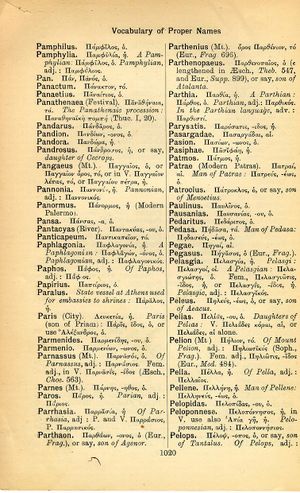Parthenopaeus: Difference between revisions
From LSJ
τἄλλαι ... γυναῖκες ... ἀπήλαἁν τὼς ἄνδρας ἀπὸ τῶν ὑσσάκων → the other women diverted the men from their vaginas
m (Text replacement - "<b class="b2">Theb.</b>" to "''Theb.''") |
(6_11) |
||
| Line 1: | Line 1: | ||
{{WoodhouseENELnames | {{WoodhouseENELnames | ||
|Text=[[File:woodhouse_1020.jpg|thumb|link={{filepath:woodhouse_1020.jpg}}]]Παρθενοπαῖος, ὁ (ε lengthened in Aesch., ''Theb.'' 547, and Eur., ''Supp.'' 899), or say, <b class="b2">son of Atalanta.</b> | |Text=[[File:woodhouse_1020.jpg|thumb|link={{filepath:woodhouse_1020.jpg}}]]Παρθενοπαῖος, ὁ (ε lengthened in Aesch., ''Theb.'' 547, and Eur., ''Supp.'' 899), or say, <b class="b2">son of Atalanta.</b> | ||
}} | |||
{{Lewis | |||
|lshtext=<b>Parthĕnŏpaeus</b>: i, m., = [[Παρθενοπαῖος]]>,<br /><b>I</b> the [[son]] of [[Meleager]] and Atalante, one of the [[seven]] [[who]] went [[against]] [[Thebes]]: [[inclutus]] armis [[Parthenopaeus]], Verg. A. 6, 480; Stat. Th. 4, 248; cf. Hyg. Fab. 99. | |||
}} | }} | ||
Revision as of 08:10, 13 August 2017
English > Greek (Woodhouse)
Παρθενοπαῖος, ὁ (ε lengthened in Aesch., Theb. 547, and Eur., Supp. 899), or say, son of Atalanta.
Latin > English (Lewis & Short)
Parthĕnŏpaeus: i, m., = Παρθενοπαῖος>,
I the son of Meleager and Atalante, one of the seven who went against Thebes: inclutus armis Parthenopaeus, Verg. A. 6, 480; Stat. Th. 4, 248; cf. Hyg. Fab. 99.

